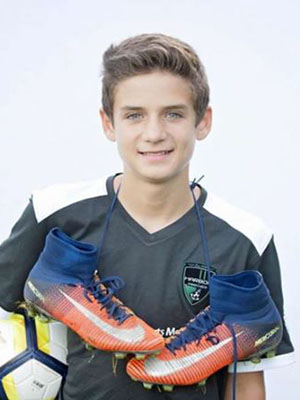A Family Finds Answers in Seattle Children’s CRMO Program
8.4.2022 | Isabelle Minasian and Ashley Speller
 From an early age, Seth Maharry has been an active kid. He started playing soccer at age 4, joined Little League at 5 and by the time he was 9, Seth earned a spot on a club team in Gig Harbor, Washington where he played soccer year-round. During a tournament in Portland, Oregon, Seth started to complain about the pain in his hip.
From an early age, Seth Maharry has been an active kid. He started playing soccer at age 4, joined Little League at 5 and by the time he was 9, Seth earned a spot on a club team in Gig Harbor, Washington where he played soccer year-round. During a tournament in Portland, Oregon, Seth started to complain about the pain in his hip.
“We figured he’d just been playing soccer all weekend,” said his mom Nora. “We saw the physical therapist and they said everything was fine, but it continued to get worse and worse.”
Seth’s parents decided to take Seth to the doctor but were told it was just growing pains, though it was clear to Nora that this was something far more serious.
“That was our battle for a year and a half,” Nora explained. “My heart just ached because I knew what we were being told was not right.”
When the family’s insurance changed, Seth’s parent’s decided to make an appointment at Seattle Children’s South Clinic in Federal Way.
“Please don’t come home without them doing a rheumatology panel,” Nora told her husband. “They did the panel and none of the results was conclusive, but they did an MRI and found something was wrong within his bones, and that was exactly what we needed to get the referral to see Dr. Zhao.”
Finally Feeling Heard
Dr. Dan (Yongdong) Zhao is the director of the CRMO Program at Seattle Children’s and leads the CRMO workgroup for the Childhood Arthritis and Rheumatology Research Alliance. He was instrumental in advocating for the dedicated clinical CRMO Program at Seattle Children’s.
“Seth had a pretty tough journey,” Dr. Zhao explained. “It’s a perfect example of how difficult this condition can be to diagnose. Eventually, they got the MRI but that takes a lot more work from medical professionals and insurance coverage.”
Prior to being seen at Seattle Children’s, Nora recalled conversations with other medical professionals about what Seth’s typical day looked like as they tried to pinpoint the cause of his pain.
“I told them about his day and the doctor said, ‘Well, he just does too much. You need to go home and just relax a little bit.’ I walked out of there and was so angry and felt so muted, and the person paying the price for that was Seth.”
Those feelings of uncertainty soon changed during the family’s first appointment with Dr. Zhao at Seattle Children’s.
“I think we were there for nearly two hours and never once did I feel like he had anywhere else to be other than with us,” Nora added. “It just felt so wonderful to be somewhere where I felt like, ‘Gosh, they believe us.’ They want to take the time to hear us and figure this out.”
They left the appointment knowing their family had made the right choice for care.
“I thought, okay, we’ve landed where Seth needs to be,” Nora said.
Making a Difficult Diagnosis Easier for Patients and Families
 Seattle Children’s has the only program in the Western states that focuses on children and teens with CRMO. The program has grown rapidly and now serves more than 200 patients.
Seattle Children’s has the only program in the Western states that focuses on children and teens with CRMO. The program has grown rapidly and now serves more than 200 patients.
Because CRMO is not widely known and can be difficult to diagnose, the learning curve for patients and families is steep. At Seattle Children’s, families have the whole pathway laid out clearly in front of them.
The addition of a dedicated clinical coordinator also enabled the team to better gather and share information with families, including a dedicated 20-page handout. This was also important in allowing basic questions to be answered ahead of time so the appointments can focus on medical management.
“I think families are very blessed by the hospital’s involvement. We’ve also done more partnering with providers which will translate to better recognition and earlier referrals,” Dr. Zhao explained. “Everything is made easier and more direct for the patients and their families.”
Because there is no FDA-approved medication specific to CRMO, patients are prescribed either nonsteroidal anti-inflammatory drugs (NSAIDs), disease-modifying antirheumatic drugs (DMARDs), biologic or bisophosphonate and carefully monitored through regular MRI scans to make sure treatment is working.
“I am always anxious for MRI results,” Seth’s mom Nora said. “But I know now after all these years, that when we go to the appointment, Dr. Zhao is first going to talk to Seth about school and soccer and guitar and anything he knows Seth is interested in. He remembers everything! I love that he not only takes care of Seth’s physical needs for CRMO, but he knows him and makes him feel so relaxed. You just can’t put a price on that.”
Building a Community and Investing in the Future
After their experience at Seattle Children’s, Nora and her husband held an auction to raise money and awareness for CRMO.
“How on Earth are we ever going to put a dent in research when no one even knows that it exists?” she said. “It’s not being diagnosed; it’s not being researched properly. We honestly had no idea what we were doing but thought, ‘We’re just going to run this from the heart.’”
Their goal was approximately $10,000 but ended up raising more than $60,000. Following the auction’s success, Nora joined Dr. Zhao, CRMO Program Co-Director Dr. Natalie Rosenwasser and registered nurse Teresa Dodds to found the CRMO Warriors Guild.
“We wanted to take what Nora and her family started and formalize it so we can continue fundraising on a regular basis, and so it won’t be a burden on one family — to really make it part of the community,” Dr. Zhao explained.
It is one of many guilds actively working to support Seattle Children’s mission and is part of the Seattle Children’s Guild Association, the largest all-volunteer fundraising network for any hospital in the nation.
For kids like Seth who receive a CRMO diagnosis, Dr. Zhao notes that there is also a large component of mental health.
“Their complaints aren’t often substantiated by X-rays or physical formations and aren’t taken seriously, and that can hurt even more,” he said. “There needs to be more of an understanding of this condition from the schools and communities. This guild can provide a louder voice — and together with the clinical program, we can serve them even better.”
Today, Seth’s symptoms are under control and he’s looking forward to the future. He recently graduated high school and will attend the University of Washington in the fall of 2022. Around the same time, the CRMO Warriors Guild is planning to hold their next fundraising event, which will include an art walk and auction.
“The guild raises awareness and provides hope for Seth and every other child whose family is trying to get a diagnosis, trying to figure out the right medications, or just trying to understand what causes all of this,” Nora said.
Dr. Zhao echoes that sentiment. “The healing is not just from the medicine but from the whole community.”